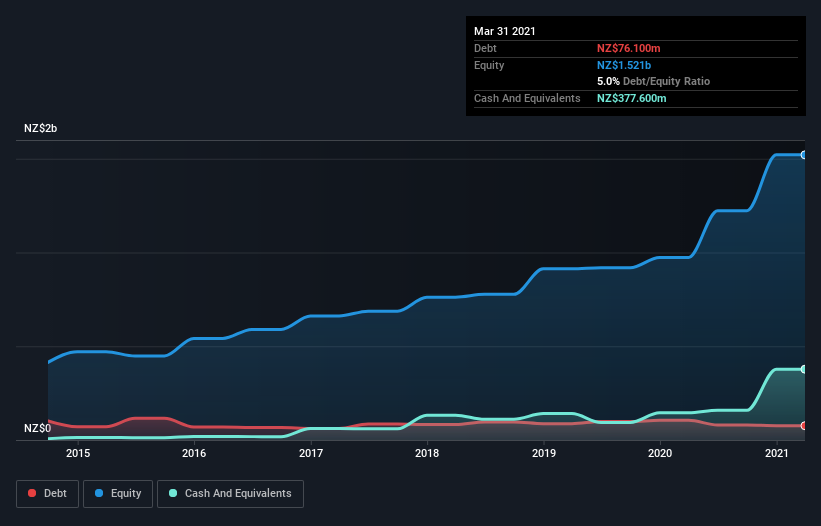Is Fisher & Paykel Healthcare (NZSE:FPH) A Risky Investment?
David Iben put it well when he said, 'Volatility is not a risk we care about. What we care about is avoiding the permanent loss of capital.' So it might be obvious that you need to consider debt, when you think about how risky any given stock is, because too much debt can sink a company. We note that Fisher & Paykel Healthcare Corporation Limited (NZSE:FPH) does have debt on its balance sheet. But the real question is whether this debt is making the company risky.
What Risk Does Debt Bring?
Debt assists a business until the business has trouble paying it off, either with new capital or with free cash flow. If things get really bad, the lenders can take control of the business. While that is not too common, we often do see indebted companies permanently diluting shareholders because lenders force them to raise capital at a distressed price. By replacing dilution, though, debt can be an extremely good tool for businesses that need capital to invest in growth at high rates of return. When we examine debt levels, we first consider both cash and debt levels, together.
View our latest analysis for Fisher & Paykel Healthcare
What Is Fisher & Paykel Healthcare's Net Debt?
The image below, which you can click on for greater detail, shows that Fisher & Paykel Healthcare had debt of NZ$76.1m at the end of March 2021, a reduction from NZ$104.9m over a year. But on the other hand it also has NZ$377.6m in cash, leading to a NZ$301.5m net cash position.
A Look At Fisher & Paykel Healthcare's Liabilities
We can see from the most recent balance sheet that Fisher & Paykel Healthcare had liabilities of NZ$427.5m falling due within a year, and liabilities of NZ$126.6m due beyond that. Offsetting this, it had NZ$377.6m in cash and NZ$228.9m in receivables that were due within 12 months. So it actually has NZ$52.4m more liquid assets than total liabilities.
Having regard to Fisher & Paykel Healthcare's size, it seems that its liquid assets are well balanced with its total liabilities. So it's very unlikely that the NZ$18.2b company is short on cash, but still worth keeping an eye on the balance sheet. Simply put, the fact that Fisher & Paykel Healthcare has more cash than debt is arguably a good indication that it can manage its debt safely.
In addition to that, we're happy to report that Fisher & Paykel Healthcare has boosted its EBIT by 88%, thus reducing the spectre of future debt repayments. There's no doubt that we learn most about debt from the balance sheet. But ultimately the future profitability of the business will decide if Fisher & Paykel Healthcare can strengthen its balance sheet over time. So if you want to see what the professionals think, you might find this free report on analyst profit forecasts to be interesting.
But our final consideration is also important, because a company cannot pay debt with paper profits; it needs cold hard cash. Fisher & Paykel Healthcare may have net cash on the balance sheet, but it is still interesting to look at how well the business converts its earnings before interest and tax (EBIT) to free cash flow, because that will influence both its need for, and its capacity to manage debt. During the last three years, Fisher & Paykel Healthcare produced sturdy free cash flow equating to 51% of its EBIT, about what we'd expect. This free cash flow puts the company in a good position to pay down debt, when appropriate.
Summing up
While we empathize with investors who find debt concerning, you should keep in mind that Fisher & Paykel Healthcare has net cash of NZ$301.5m, as well as more liquid assets than liabilities. And we liked the look of last year's 88% year-on-year EBIT growth. So we don't think Fisher & Paykel Healthcare's use of debt is risky. There's no doubt that we learn most about debt from the balance sheet. However, not all investment risk resides within the balance sheet - far from it. We've identified 1 warning sign with Fisher & Paykel Healthcare , and understanding them should be part of your investment process.
At the end of the day, it's often better to focus on companies that are free from net debt. You can access our special list of such companies (all with a track record of profit growth). It's free.
This article by Simply Wall St is general in nature. We provide commentary based on historical data and analyst forecasts only using an unbiased methodology and our articles are not intended to be financial advice. It does not constitute a recommendation to buy or sell any stock, and does not take account of your objectives, or your financial situation. We aim to bring you long-term focused analysis driven by fundamental data. Note that our analysis may not factor in the latest price-sensitive company announcements or qualitative material. Simply Wall St has no position in any stocks mentioned.
Have feedback on this article? Concerned about the content? Get in touch with us directly. Alternatively, email editorial-team (at) simplywallst.com.

 Yahoo Finance
Yahoo Finance 
